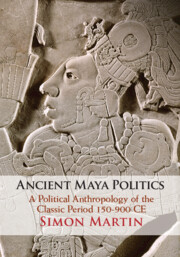Book contents
- Ancient Maya Politics
- Ancient Maya Politics
- Copyright page
- Dedication
- Contents
- Illustrations
- Maps
- Tables
- Case studies
- Preface
- One Introduction: The Questions
- Part I Agendas in Classic Maya Politics
- Part II Epigraphic Data on Classic Maya Politics
- Five Identity
- Six Constitution
- Seven Transcendence
- Eight Matrimony
- Nine Conflict
- Ten Hierarchy
- Eleven Coda
- Part III A Political Anthropology for the Classic Maya
- Appendix An Inventory of Emblem Glyphs
- Notes
- References
- Index
Six - Constitution
from Part II - Epigraphic Data on Classic Maya Politics
Published online by Cambridge University Press: 13 July 2020
- Ancient Maya Politics
- Ancient Maya Politics
- Copyright page
- Dedication
- Contents
- Illustrations
- Maps
- Tables
- Case studies
- Preface
- One Introduction: The Questions
- Part I Agendas in Classic Maya Politics
- Part II Epigraphic Data on Classic Maya Politics
- Five Identity
- Six Constitution
- Seven Transcendence
- Eight Matrimony
- Nine Conflict
- Ten Hierarchy
- Eleven Coda
- Part III A Political Anthropology for the Classic Maya
- Appendix An Inventory of Emblem Glyphs
- Notes
- References
- Index
Summary
Chapter 5 explored the self-definition of the Classic Maya elite within a range of statuses, offices, ranks, and roles – marks of authority and entitlement that centred upon and radiated from a “holy” ruler. We now need to turn to how this collective noblesse went about constituting and maintaining a political community. Politics can never be reduced to a state of being since it always implies active, substantive acts that establish, maintain, and extend power relations. These acts are guided by formal and informal norms, rules, and protocols that express the structural properties of the system. To recover even an outline appreciation of these properties we must first take the textual record on offer, recognising its idealised, retrospective, and highly selective character, and then look beyond to what these tightly controlled narratives refer to only obliquely, or reveal only through statistical analysis. Very often it is the exceptions that demonstrate the rules, the anomalies and deviations that illuminate where orthodoxy gives way to exigency in a contingent world.
- Type
- Chapter
- Information
- Ancient Maya PoliticsA Political Anthropology of the Classic Period 150–900 CE, pp. 102 - 142Publisher: Cambridge University PressPrint publication year: 2020

